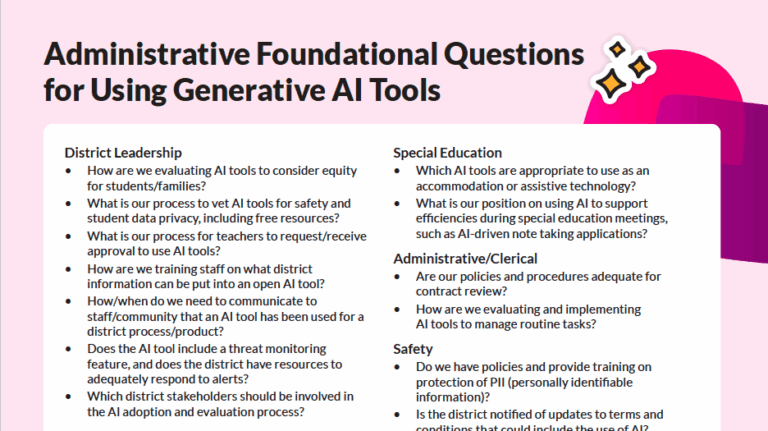The following article was written by Ruzanna Krdilyan Hernandez, Ed.D.
A teacher would tell you it is the best feeling in the world when a student learns a concept and feels that sense of accomplishment. The student’s accomplishment becomes the teacher’s accomplishment. Seeing how the students make progress, especially year after year as they move ahead and make positive leaps and bounds in their lives is truly magnificent.
New teachers already know or suspect this. That is why they go into teaching in the first place.
There are so many great reasons to consider teaching as a career. Working with young people is rewarding and gratifying. However, it is important for a person who has just graduated from college and is thinking about choosing it as a profession to know that it is not easy.
As administrators, we must consider the difficulties associated with teaching and what we can do to support new teachers.
Retirements and new recruits
According to USA Today, there is a 20 percent increase in retirements reported by teachers now compared to 2019. A majority of teachers retiring are doing so due to COVID-19 concerns. With thousands of teachers putting in their retirement paperwork between now and the end of the school year, as administrators, we need to be ready to help new recruits with what they might need coming into the profession.
Why teaching is difficult
If there are so many rewards and positive outcomes tied to teaching, why is it difficult?
There are certain things teachers are not necessarily taught in their credentialing programs. Here are eight factors that college students may have not considered about the teaching profession and ideas for how we, as administrators, can help support them in their journey.
1) Teaching requires some showmanship. In order to keep the kids’ attention and get them engaged, the teacher must be able to teach the lesson well enough to keep the audience captivated or they will lose interest. Great teachers find ways to keep kids engaged and learning.
- Work with a veteran teacher who has high energy and great showmanship or storytelling skills and pair them up with the new teacher. Ask them to get together and tell you exactly when the visits will be conducted. After each one, schedule a 15-minute debriefing meeting with the new teacher.
- Ask the new teacher if their instruction can be recorded. Help them set up their own camera at the back of the class to record so they know they are the only ones who have access to the footage. Give them two or three days to review the video and schedule a 15-minute meeting to debrief on what they liked or did not like about their performance.
- Tell them what you did that worked for you in showing lots of energy and enthusiasm when you were a classroom teacher — especially on days when you were tired and stressed. This type of a conversation may need to be repeated throughout the year, depending on how well the teacher is doing in engaging students with lessons. How did you keep up your energy levels at the end of the day? How did you self-motivate to “be on” when you arrived at work on Mondays?
2) Teaching is 50 percent delivering of content effectively and 50 percent social-emotional support. The students are human beings experiencing all kinds of life-changing situations. Teaching is not just about the content being delivered — it is about being able to listen and support students, and sometimes even the parents.
- Put on your schedule or planner to send one new article to the new teachers to read about social-emotional support each week. Ask them to read and reply with one or two things they learned. Their replies must be actionable. That means, they have to say what they can do in the classroom as a result of their reading.
- Let them know at the beginning of their journey that teaching is about learning and developing, which means it is an expectation that they will attend seminars, conferences, and symposiums to develop in their professions. They should be attending district trainings, online webinars, or outside seminars and conferences once every two months. As an administrator, check with them to see what they are planning to debrief on their progress. Put on your planner or schedule to ask about this once each month (specific events that they are participating in either online or in-person).
- Pair them up with a counselor at the school level or district level so as soon as they have a specific situation with a student involving social-emotional support, they can reach out for help. Put on your schedule to check in with the counselor to make sure conversations are taking place once every two weeks.
3) Students can be disrespectful and disruptive in the classroom despite the teacher’s best efforts. For a person who is considering going into teaching as a career, it is important to note this because knowing what you are getting into will help one stay calm and collected.
- Keep reminding the new teacher that they will probably run into some of their most disruptive students in the future. After each referral or student issue that they have, remind them that kids are kids, and their forms of expression are different than those of adults. If you tell them enough, they will start to feel and agree that it is not a good idea to take the disruption or disrespect personally.
- Ask other teachers in the department to check in with the new teacher at least once each week to ask about student behavior and disruptions. They can informally share with one another their concerns and strategies. Your job as an administrator would be to put on your schedule or calendar a quick visit or phone call with some of the teachers in the department or the department chair to see how often they are checking on the new teacher. They should be checking in (informally) at least once each week. New teachers learn from other teachers more readily and willingly than from their evaluators.
4) Teaching requires grading — especially depending on what you teach. Just like lesson planning is time-consuming, so is grading. If you assign work, and give quizzes and tests, the teacher must be up for grading and returning the work as quickly as possible to their students. There may be afternoons and evenings when instead of hanging out and doing leisurely activities, the teacher is grading.
Time management, efficiency (how well you use your time and energy in a short period of time), and organizational skills are the key. Fortunately, these are qualities and skills that can be learned!
- Give the new teacher a lesson plan template to use that specifically times each portion of the lesson. There are some excellent resources for these that can be found on efficiencyandorganization.com in the Educator page. Check in to see how they are using the template once every two weeks. Write this in your planner or schedule because otherwise, you will forget.
- Let them know what strategies worked for you when you were a classroom teacher to be effective at your job. Share something once each month in the first year. Opening up to them will also help them gain trust with you. They will be more opening to approaching with questions.
- Put on your schedule or planner to do a brief check-in for five minutes every two weeks to see how the teacher is doing with classroom organization. Give them helpful hints and strategies. If organization is not learned in the beginning, it will likely impact classroom management and delivery of the lessons. Visit the room for five minutes and give feedback on what was working well and what was not working well specifically with time management, grading and planning.
5) A teacher must be open to learning and improving no matter how many years he or she has been in the classroom. Our world is constantly changing, and teachers must be open-minded to new ways of doing things.
- Share articles and resources with the new teacher once each week and ask them to reply with their responses. They must give one or two actionable items they learned that they could possibly use.
- Let them know at the very beginning that it is an expectation that they attend trainings, symposiums, conferences, read books and listen to webinars on a monthly basis. If they schedule something each month, they will hold themselves accountable. Have them tell you what they are doing each month to educate themselves more. They may have gone through a credentialing program but that does not mean they have stopped learning and developing. Plus, being in the classroom and developing strategies is different than being in a credentialing program. Reality is always different than what we first imagine when we are sitting in classrooms.
6) Teaching is not one of the highest-paying professions out there. In fact, there are many teachers who do side jobs to generate extra income because it is difficult to make ends meet, especially in the first five years of teaching. According to the National Education Association, about 20 percent of teachers hold second jobs during the regular school year.
It is important to consider what school districts are paying and if the money paid is going to afford the lifestyle the new teacher desires. With financial organization and planning, a person going into the profession can make ends meet if they have a passion for changing the lives of others.
- If you hear of the teacher doing side jobs, be supportive and understanding. If they are doing their best with grading, lesson planning, lesson delivery and student support, they are doing their job.
- Encourage them to look for additional assignments within the school or district after their first two years in the classroom. By doing this, they are earning extra income while serving the school and the district, rather than working outside of education.
7) There is a lot of administrative work that must be done that teachers do not often realize until they get into the profession. This involves sitting in meetings, taking attendance, correcting attendance, making phone calls, putting independent study materials together, filling out paperwork and much more. These extra tasks are time-consuming, so it is important to take that into consideration.
Once again, this is where time management, efficiency and organizational skills come in. Otherwise, the feeling of being overwhelmed can be highly stressful, especially for a new teacher.
- If you see the new teacher is falling behind on the administrative work that is required of them, give them structured resources and help them with time management skills.
- Have the department chairs explain how they meet the required administrative work duties that need to be done and share from your own experiences. What did you do to keep up with it all? Be specific so the teacher can get actionable feedback on what he or she can do.
8) Because teachers are role-models, whether they know it or not, there is some added pressure involved, much like a celebrity. It can be overwhelming for some teachers to be in the spotlight, placed there by students, parents and other stakeholders.
- Ask the new teachers how they are feeling being in the spotlight in the classroom when you meet once each month. What have they learned? What do they need help with? Are they having a hard time dealing with parents? Lend an ear to hear them talk for 10 to 15 minutes about their new role just once each semester or trimester.
- It helps to talk to the new teacher about ethical rules they might not be aware of. They need to know it’s important to keep their private lives private. They need to be careful about social media postings and befriending their students.
In conclusion, creating a plan to implement these suggestions will help us stay organized and focused on helping teachers succeed. With some planning and scheduling of actionable items (see sample timeline below), administrators will be able to coach, mentor and support their new teachers in the new school year.
Ruzanna Hernandez has been working at Fontana Unified School District for the past 13 years and is currently assistant principal at Fontana Adult School.
References
Sample Timeline for New Teacher Supports
|
Tasks |
When to schedule in planner |
| Check-in with Induction Program mentor. | Every two months on the first week (September, November, January, March, May) |
| Assign mentor teacher; schedule check-ins with new teacher for additional support. | Third week of August
Second week of September First week of October |
| Have teacher record themselves teaching; schedule meeting to debrief. | Late September or early October (15 minutes) |
| Meet to discuss student/teacher engagement. | Every two weeks (5 to 10 minutes) |
| Print/forward 1 new article to teacher on social-emotional support; request feedback. | Weekly |
| Have teacher meet with counselor/district support specialist every two weeks to discuss social-emotional supports for students. | Check in with teacher on progress monthly |
| Meet following a referral or student issue for emotional support. | As needed (10 to 15 minutes) |
| Check with department chair if informal supportive meetings are taking place for teacher. | Every two weeks |
| Provide lesson plan template. | First week of each month check on use of organized lesson plan. |
| Share a new teaching strategy, perhaps from your own experience. | Second week of the month |
| Visit classroom and provide nonjudgmental feedback. | Every two weeks (5 minutes or less) |
| Check on teacher’s participation in 4 professional development opportunities. | Debrief with teacher after each (15 minutes) |
| Ask new teacher to visit effective teacher’s classroom 4 times in the first two years. | Debrief with teacher after each visit |
| Discuss time management resources (if needed). | As needed |
| Meet to talk about leadership role of teacher. | Sometime in 1st semester (15 minutes) |
| Meet to discuss ethical issues concerning teachers. | Sometime in 2nd semester |


































